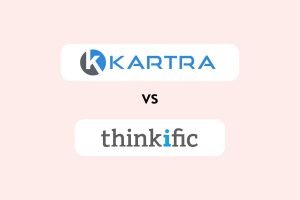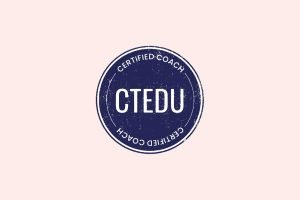Last updated on August 5, 2023
Once I became a certified coach and started my business, something incredible happened: I created a space where I could fully express my lifelong love of helping others while generating a sustainable income for myself. But none of that success happened overnight (it never does).
In the early days, I was overwhelmed by all the details of starting my own coaching business, which diverted valuable time and attention away from the actual coaching.
The process of starting your own coaching business doesn’t need to be that complicated. So let’s simplify it.
The neverending Google search
You know the kind of Google search I’m referring to. The one with no end in sight, which usually begins with a question as simple as, “How do I start a life coaching business?”
I googled this exact question in 2014 from my makeshift dining room office. While my search didn’t yield much of value, I recall vividly what it didn’t include: information that would help me set up a profitable and supportive business, organizational skills, and how to track the ins and outs of my soon-to-be growing life coaching practice.
So now I’m offering you the little checklist I wish I had when I started.
You are not your business
You may be the one providing the service and earning the money, but, in the eyes of the law, you and your business are separate entities and you must be organized in a way that shows this.
1. Decide on a business name
I know this is obvious, but without it, you can’t formally file for a business license or open a bank account for your clients to pay you.
Personally, I’d keep your formal business name as something that will never change.
I used my name because I knew I would always be Andrea, and that was simple enough.
You can get as creative as you desire with your program names. But the umbrella that everything gets housed under? Don’t try to be clever. Make it easy.
2. File for a business license
What you’re really doing here is filing for an EIN number, which acts like a Social Security number for your business and allows the Treasury Department to track your business.
You will have to decide on the right business type for you. There are pros and cons to all of them, so I would highly recommend hiring a tax accountant to help you make an informed decision based on the laws and tax requirements of your state.
3. Open a business checking and business savings account
As obvious as this may seem, I cannot tell you how many coaches I work with who are paying themselves right out of their personal accounts.
This is a big no-no. You just need your EIN number to open these accounts, and then bam, you’ll have a business!
You are also a business manager
We all get into coaching to coach—not to run side hustles. But the difference between a growing business and something that only makes you a little cash on the side is your role as a business manager.

While it might be tempting to rush past this and hire someone else to handle it, understanding the following items is extremely important and will feel hugely empowering.
4. Track and measure every single number
There are some key numbers that you need to track in your business that will tell you everything you need to know about how sustainable your venture really is.
- Income: How much money comes in monthly, quarterly, and annually? This is also called gross revenue.
- Expenses: How much of that money was spent on things inside the business, like a website, client gifts, and credit card fees? When you subtract your expenses from your income you get something called net revenue. The government will want a piece of this pie come tax season.
- Margins: Compare how much you spent versus how much you earned. I recommend keeping your expenses, which don’t include your paycheck, to 30% or less. This means you’d have a 70% gross margin.
- Leads: How many people opt into your marketing?
- Conversion rates: How many of these people become clients?
- Renewals: How many of these clients stay or renew?
5. Get paid
You won’t get to personally touch 100% of what the business makes because you will have expenses, you will need to pay taxes, and you will need to save a little profit for a rainy day fund.
If your expenses are 30% of your gross revenue, expect to also pay 20-30% (or more) in taxes on your net income.
I also recommend you put aside a portion each month into your savings account. This will vary depending on your business structure, tax liability, expenses, and more.
Pay your taxes, please
Being paid for services means being liable for taxes. Taxes are our civic duty, and, as a business owner, you are responsible for paying these annually (and in some cases quarterly).
Taxes are how we collectively take care of critical infrastructure like city roads and clean water, supply government assistance programs like disability and free lunch programs, keep Medicare available to people over 65, and supply Social Security for our retiring population.

In 2021, my wife and I built a house. Of course, part of this incredible adventure was sourcing appropriate funding to pay for this project. But when we filed for our loan, something surprising happened: The bank didn’t actually care how much my business made. The bank only cared how much I paid taxes on.
Let that sink in. Because if you’re writing everything off to save on your tax bill but still want to refinance your home, buy a home, or take out a small business loan one day, know that your tax contribution paints a detailed picture of who you, as a potential borrower, are in the eyes of loan institutions. And it’s the only picture that will matter to them.
*I am not a tax accountant and have no fiduciary responsibility. All tax questions must be referred to a tax professional in the state where you do business.
6. Create an online presence
While having an online presence is important, it’s crucial for new coaches not to invest excessive time and energy into it at the beginning. Instead, focus on creating a basic website that includes essential elements such as a small introduction to your coaching mission, a section about you as a coach, and clear information about the services you provide.
Interestingly, when I conducted a poll within my own community, I discovered that more than 98% of clients were initially introduced to me through referrals and personal recommendations rather than my marketing. This is a common trend. Your website should serve as a means to confirm and reinforce someone’s positive assumptions about you and your work, rather than solely convincing them to hire you.
Encourage visitors to take a second step
Once someone has come across your website, give them an easy next step. I suggest an email opt-in.
Email marketing remains one of the highest-converting marketing strategies to date. Offer a valuable resource such as a free guide, e-book, or fresh content.
Your website should serve as a means to confirm and reinforce someone’s positive assumptions about you and your work, rather than solely convincing them to hire you.
It’s also important to note that you don’t need to send an email every day. Find the right pace and frequency for you—consistency is more important than quantity. To date, my only marketing is a modest email list of 1,200 subscribers and a free online community. No social media is required!
7. Book your first client
There is an abundance of advice circulating today about the best ways to both secure your first client and build up a steady stream of clients. This can make something that already seems intimidating feel that much more overwhelming.

I felt all this when starting my practice. There were even times (many, actually) when I hoped that a consultation wouldn’t pick up the phone! But I promise you that booking your first client is much easier than it may initially seem.
Your community genuinely wants to see you succeed and is excited to learn about your new venture. The first and simplest step I recommend for new coaches is to write an “unveiling” letter. This letter allows you to share with your friends, family, and extended community that you have stepped into the role of a life coach.
Additionally, consider offering a one-month coaching gift to those in your inner circle or anyone they believe could benefit from coaching. Remember, coaching is merely a tool, so be sure and share the vision you have for coaching.
Write an “unveiling” letter. This letter allows you to share with your friends, family, and extended community that you have stepped into the role of a life coach.
Furthermore, I suggest delving into the additional articles I’ve shared in Life Coach Magazine. These articles provide valuable guidance on designing your first coaching program and growing your coaching practice without relying heavily on social media.
Life coaching can be a meaningful career, full of regular opportunities to support the expansion of our collective humanity and see people flourish in ways they may never have thought possible. Setting yourself up for success from the start will help you grow more easefully into your coaching practice, making it that much easier for you to focus on what most nourishes you and your gifts: your genuine love of coaching.

Andrea Leda
Andrea Leda is a sought-after master coach, teacher, and mentor with over 10,000 hours of coaching experience since she began her practice in 2010. She is dedicated to helping each of us learn to trust our own innate value and worthiness so that we can show up for the work we’re truly here to do.
By harnessing her deep and practical knowledge of powerful coaching techniques—including NLP, journal therapy, mental emotional release work, and BodyMAP coaching—Andrea supports heart-centered coaches and visionary change-makers in reaching their fullest potential in both life and business. In her coaching work, she has been called "a force to be reckoned with and a brave woman who truly makes this world go round.”
In 2022, Andrea founded Braver Coach—a mission, a community, and an educational platform for coaches who are reimagining coaching by bringing forth all of who they are. As a certified training organization through the Association of Coaching, Andrea equips coaches so that they feel empowered to do the work they are called to do—and help their clients and communities do the same.
















Be First to Comment